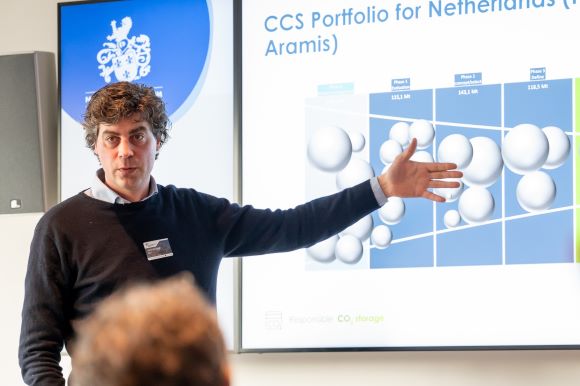
FOCUS GROUP CCUS REPORT 03-2024
When you know a lot about a subject, it is striking and at times frustrating to read or hear incorrect information. This goes for any subject but seems especially true for CCUS, which is regularly discussed in statements that reveal a lack of knowledge or even a bias about the technology and the role it can play.
If it were up to Brigitte Jacobs, ERC’s CCUS Focus Group lead, that will soon change. Brigitte is Business Developer CCUS at TNO and programme manager CCUS within TKI New Gas. During the CCUS Focus Group session on 7 March, Brigitte shared how TKI New Gas and De Gemeynt, a sustainability consultancy, are developing a narrative for CCUS. Its objective: to develop a story that is logical, carefully built, balanced and constructive, which accurately positions CCS and creates sufficient points of engagement to enhance broad support.
A preliminary conclusion based on research done to date by TKI New Gas and De Gemeynt is that in between a sharper pro-industry sentiment on the one hand and a sharper anti-fossil sentiment on the other, lies space for nuance. Instead of viewing CCS solely as a necessary technology to meet climate targets, CCS is regarded as part of a broader strategy for industrial carbon management and negative emissions. In the debate about carbon constrained industrial transformation, CCS is an indispensable ingredient of that transformation.
The initiative is well-timed. The European Commission recently published the EU Industrial Carbon Management Strategy and the Net-Zero Industry Act. Several EU member states have recently announced, published or updated national energy and climate strategies paying attention to the role of CCS. During a recent parliamentary debate the Dutch government has been asked to develop a CCS strategy for The Netherlands.
Even without a clear Dutch governmental strategy, CCS-projects are being developed in The Netherlands. Joris de Jongh, CCS Project / Asset Manager at EBN, gave an update on the Porthos and Aramis projects, as well as the envisioned future CCS portfolio for The Netherlands. After permitting delays, the Porthos project has started construction and plans to inject first CO2 in 2026. The Aramis project expects to be ready for first injection in 2028 or 2029.

Developing CCS projects and especially a CCS portfolio of projects needs sufficient public acceptance. It doesn’t mean that people have to cheer in the streets. When it comes to CCS, absence of societal resistance, as was the case in 2008 around the Barendrecht CCS project, is already a marked change.
Marit Sprenkeling, researcher at TNO Vector, Centre for Societal Innovation and Strategy, shared her insights regarding “societal embeddedness” of CCS. Societal embeddedness is a step up from public acceptance and refers to taking into account the total of non-technical aspects that influence the societal uptake and success of new technology development and deployment in a societal context. Non-technical aspects include the policy framework and financial resources and public perception. Public perception in turn is shaped by a mix of factors. Sprenkeling highlighted trust and justice and emphasized that these play a role anywhere – also in the case of offshore storage.
The number of CCS projects is growing as we speak, concluded Brigitte Jacobs and the EU’s Industrial Carbon Management strategy underscores the role of carbon storage, carbon removal and utilization. Public engagement, as early as possible in the process, is a key ingredient for success.
CHECK OUT THE PROGRAM FOR THE UPCOMING SESSION ON 4 JUNE
The next CCUS Focus Group meeting on 4 June 2024 will be in collaboration with the Focus Group on Financing Energy Transition. On the agenda: CCU technology developments in the Field Lab of Industrial Electrification (FLIE) located in Rotterdam and CCUS financing options.
VIEW PRESENTATIONS 7 MARCH
The presentations from the CCUS Focus Group session can be found on the ERC website www.energyreinventedcommunity.com:
-
Login and head to FORUM
-
Select EVENTS
-
Select the folder 2024-03 CHANGING DEMAND IN THE BUILT ENVIRONMENT





